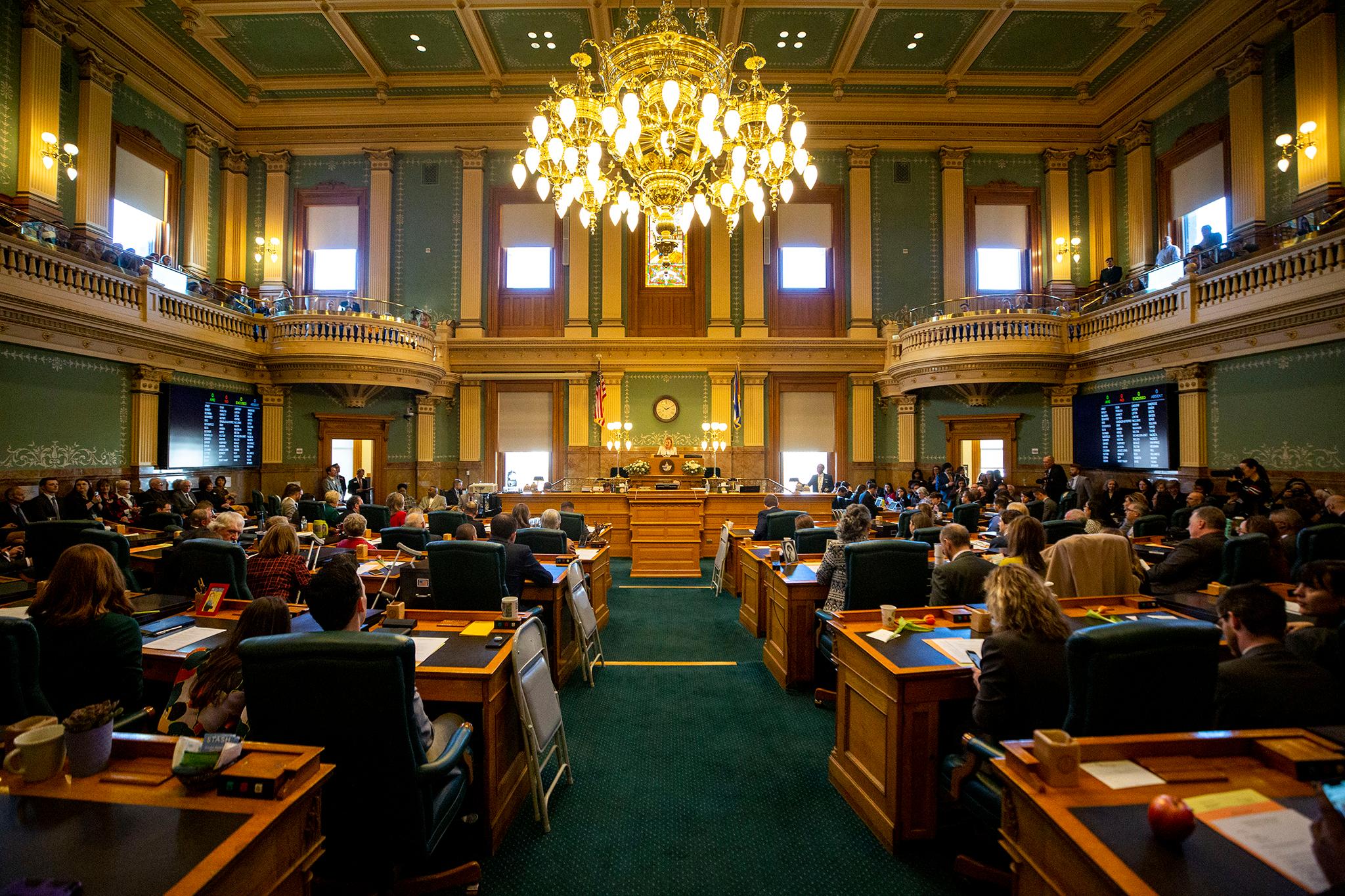
Late nights aren’t a new phenomenon at the Colorado statehouse, but House members have been working into the wee hours — and coming in on the weekends — a lot this year. It’s a sign of how an ambitious Democratic majority is running headlong into Republican lawmakers determined to use one of the few powers they have left: their voices.
The result is some of the longest lawmaking marathons in recent memory.
Democrats hold their widest majority ever in the state Capitol, after gaining seats in the 2022 election. The party is using what it sees as a mandate from voters to move forward hot button issues like abortion access, gender-affirming care for trans youth, and stricter gun laws.
Without the votes to stop these bills, Republicans are showing their objections by doing what they can to slow down the lawmaking process.
In some ways, long debates have always been the price of passing controversial bills. But lawmakers in both political parties are approaching contentious debates differently than they have in the past, with Republicans trying to force more legislative all-nighters and Democrats dusting off a hundred-year-old rule to shut them down.
How this all plays out could have repercussions for the rest of the legislative session, and determine what passes.
Does Colorado have a filibuster? You betcha.
For many people, the word ‘filibuster’ calls to mind impassioned, drawn-out speeches dramatized in films like 1939’s “Mr. Smith Goes to Washington.”
The US Senate effectively did away with Jimmy Stewart-style filibustering in 1975, when it created the ‘silent filibuster’. But the tradition — or at least its humorous possibilities — lives on in Hollywood’s imagination:
Filibusters at the Colorado capitol have both similarities and differences compared to those cinematic examples. Here, the chance for a filibuster happens during the initial vote by the full chamber. At that stage, lawmakers are allowed to ‘debate’ a bill for as long as they can keep speaking. And while that debate is going on, no other work can get done on that side of the legislature, including votes on different bills or committee hearings.
Colorado rules do require that whatever lawmakers say must be, to some degree, connected to the bill being discussed, which means a member can’t go to the microphone and read a phone book or monologue about Star Wars movies.
But the goal is the same — to delay a piece of legislation, with the idea of either preventing a vote from occurring, effectively defeating it, or creating enough of a delay to gain leverage and win a few concessions on the policy before it may move forward.
While filibusters can seem like political theatrics, they can also impact how many bills pass, and what’s included in them.
And even when a filibuster doesn’t result in any tangible victory, it can be a way for lawmakers to register their anger, and to show their constituents that they’re fighting as hard as they can even though they know they’re not going to win.
What does it take to filibuster?
To answer this question, there might be no one better to ask than state Sen. Bob Gardner. The Colorado Springs Republican is in his 15th year at the legislature and is renowned inside the Capitol for his ability to talk on bills for a really, really, really long time.
Gardner said filibustering takes careful preparation to ensure that he can stay, at least nominally, on topic. He reads the bill in full and researches the varying policy points. He doesn’t prepare exact remarks ahead of time, but thinks through the points he can make.
“Some of it is then to raise questions in your own mind and ask a question about it outloud and say (to the chamber), ‘well, maybe you're wondering this about the bill?’” said Gardner. “And of course, mostly they're not wondering, they were just wondering when I might stop or if they'll get to go home for dinner.”
Gardner said in many ways, talking about policy for that length is a form of art, a skill he’s honed as a practicing attorney, and in the early part of his career when he taught law at the U.S Air Force Academy.
His advice?
“Speak slowly enough that you think about everything you say before you say it, otherwise you'll find yourself in trouble.” (Off-the-cuff remarks during debates have gotten numerous lawmakers in hot water over the years.)
And even when the subject of the debate is serious and the opposition effort is grueling — Gardner said he once stood for six hours straight arguing over a bill — he said you can still try to have some fun with it.
“It helps a lot to have a little bit of a sense of humor when you're doing it. At least it keeps your audience from becoming too hostile.”
Is there any way for the other side to break the filibuster? Indeed there is.
Unlike the U.S Senate, which requires that 60-vote threshold to get past a filibuster, Colorado has something called Rule 14, which only takes a simple majority to pass and can limit debate on a bill to as little as an hour.
Rule 14 is invoked incredibly rarely at the legislature. Or it was until this year. In recent weeks House Democrats turned to it several times to cut off Republican objections to bills about guns and abortion.
If the majority has this tool, why don’t they use it all the time?
Democrats and Republicans, when they’ve been in power, have generally declined to use Rule 14, saying that they want to respect the traditions of Colorado’s democratic institutions and let the process play out in the usual way, which is that filibusters can buy the minority party time to negotiate amendments behind the scenes.
The current Democratic leadership has said they want the minority party to be able to have their voices heard, express opposition and engage in vigorous and substantive debates on policy issues.
There’s also some political calculus in using a rule like this, which voters may view as the majority using its power to unfairly silence members of the minority.
For a long time, when Colorado politics really were purple and control of the chambers went back and forth between the parties, there was more fear of the potential political consequences from shutting down debate.
So why are Democrats using it now?
When it comes to the recent debates over guns and abortion, Democrats said they don’t believe Republicans were negotiating in good faith, and instead saw the filibuster from some GOP members as nothing more than a way to slow down Democratic policies from moving forward this session.
Indeed, some Republicans representatives have said they would talk for as long as physically possible to oppose the bills, if allowed.
Democrats are also feeling more confident in their wide political majority and don’t want to allow a small minority derail their agenda. They’re less concerned about potential political consequences than in past years and feel they have a mandate from voters to pass policies such as stricter gun laws and ensure access to abortion.
The question, now the party has broken out Rule 14 a few times, is whether they will keep it a tool of last resort, or start to see it as the best route to passing their most controversial bills.









